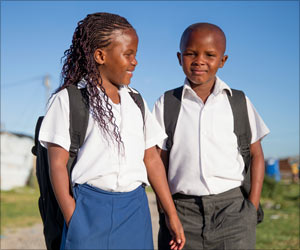Many of Shakira and Versace's friends in the small Romanian town of Barbulesti do not know how to hold a pencil. Like many Roma kids, they have never had one, say reports.
However there is a growing realization that to change the desperate state of the Roma community, you have to catch them young.And now Shakira, Versace and 18 other children aged between three and five have embarked on an intensive course to get them ready for kindergarten, a first step to reducing the high rate of school failure among the Roma minority.
Over four weeks before school starts on September 15, they are being given lessons ranging from how to express themselves to basic hygiene.
"The sooner we start, the better we develop the children's knowledge and social abilities," says Miralena Mamina from Save the Children, the non-government group that is organizing the program for 860 kids who will be going to school for the first time.
In a room with pictures of fairy tale characters pinned on the walls next to numbers and letters, teacher Mihaela Rantes smiles as her young charges sit coloring or assembling plastic pieces.
From time to time she asks for help from an assistant, given the official title of "mediator", who translates from Romanian to Romani, the traditional Roma language.
Advertisement
Their worries are fueled by events such as a recent concert by US pop singer Madonna in Bucharest when several thousands fans jeered her after she condemned "discrimination against Romas and gypsies in general in eastern Europe".
Advertisement
Constantin Stoica, a 55 year-old former locksmith, started work as a "mediator" three years ago after finishing an Education Ministry course. He talks endlessly with parents from his Roma community to convince them of the importance of going to school.
"I give them my example. Even at my age, I went to school", he said, adding that all of his 30 nephews went to school or will go.
Countless Roma children do not go to school or drop out after primary school. According to a 2008 government study, 19 percent of Romas aged 18 to 29 have never been to school, compared to 1.8 percent of non-Roma Romanians.
Poverty, distrust in institutions seen as racist, and early marriages in the traditional communities are among the complex causes of this lack of schooling.
"Due to enduring social exclusion, school is not seen as a valuable thing," said Nicoleta Bitu of the Roma rights group Romani Criss.
"One can not achieve anything with it. Even if you do great in school you remain society's 'tzigan'," she added, referring to the pejorative term for gypsy in Romania.
"There is always someone to remind you that you are just a gypsy."
She said that some teachers use language which discourages children from continuing school. And despite an official ban on segregation between communities in schools, Romani Criss keeps bringing cases to light.
Authorities admit there is still a long way to go but stress they are making progress.
Gheorghe Sarau from the Education Ministry said there were 129,000 Roma children registered in schools in 1990 and the figure has since risen to 260,000.
Some 650 mediators like Stoica liaise between schools and Roma communities, 500 people have been trained to teach Romani and up to 90 percent of the 500 places reserved each year in universities for Roma students are occupied, he said.
"Learning Romani and learning about Roma culture helps young people know their roots, build their self-esteem and value their ethnic heritage", Sarau said.
The National Agency for Romas favors active efforts to fight school failure that also include house rehabilitation and finding jobs for parents.
Every morning in Barbulesti, a parent attends classes to be more involved in the education. "My daughter brags everyday about what she has done at the kindergarten", said Loredana Dinca, a 29-year-old mother of seven, who is delighted that her children can help her read bills and other documents.
Source-AFP
ARU








